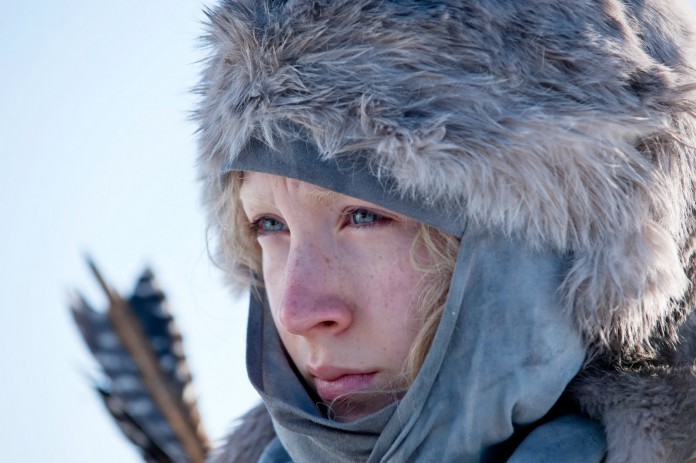Gabrielle Hew
Staff Writer
At this year’s WonderCon, a panel was held to promote the upcoming fantasy action thriller Hanna, a film loosely based on the fairy tale motif of a young girl growing up in isolation. In the film, a young girl is raised in seclusion and trained to be an assassin by her father. Director Joe Wright (Pride and Prejudice, Atonement, The Soloist) and leading actress Saoirse Ronan (Atonement, The Lovely Bones) appeared to discuss the film and answer fan questions. I later attended a roundtable where I was able to speak one-on-one with them.
Hanna is Wright’s first action film; he says he ended up directing the film purely on suggestion from Ronan, who assumes the title role. It is a major departure from his previous films, which are dramas and book adaptations. When speaking of his approach to filming, Wright remarked that the lack of source material was liberating.
“We had a very free arena to play in,” he said.
He mentioned that Hanna is a very European film which pays homage to French New Wave cinema, Italian films and 1960’s spy flicks. He also commented on his love for the “marriage of sound and vision” through the medium of film, noting that he believes sound is often underused in cinema.
When asked his opinion on 3D and D-Box, Wright admitted he had never heard of D-Box.
“I love cinema for what it is. I’m not interested in circus gimmicks,” he said.
The director also spoke at length about the film’s soundtrack, which is an original score by the Chemical Brothers. The trailer, as well as the few scenes shown at the panel, featured the unique music – an intriguing mesh of heavy bass and pulsing techno beats.
Interestingly, Wright brought up the character of Hanna in relation to feminism. He stated that Hanna exemplifies a true feminist heroine because of her intelligence. Later, he went on to criticize the modern conception of “girl power,” which uses sex appeal. He also berated a few “recent films” featuring women in skimpy school-girl outfits and toting machine guns.
“Female empowerment is not about sex. It’s about brains…not objectifying women. Hanna exists outside of that culture – she has never been a part of it,” he said.
Ronan agreed with Wright’s views.
“It’s important to have female characters that are not sexy or cool. Hanna is quite elegant in her temperament and behavior. We need interesting young women to force people to talk about this issue,” she said.
Ronan went on to speak fondly of her experiences working on Hanna, noting that her development of the character was aided by the fact that the film was shot in chronological order.
“I had to wipe my mind of anything I had gone through, because she had not gone through it. It was a fantastic exercise, and one of the purest exercises that I’ve done,” she said.
Ronan also spoke at length about her fondness for the character, describing Hanna as “quite a pure character, a pure young girl.” Upon mentioning her rigorous training for the film, she remarked, “Suddenly I had muscles- it was quite an empowering feeling!”
It is it quite evident that Ronan enjoyed playing Hanna because she is a feminist hero, a complicated character, and a fine role model for young girls, including Ronan herself.
“Every now and again I think ‘what would Hanna do?’” she said.
During the roundtable, Wright was asked about the challenges he incurred while filming Hanna.
“I was not looking for an action movie, it kind of happened. I was very intrigued by the character of Hanna. She has a unique perspective on the world, and I was fascinated by the challenge of shooting action,” he said.
He then recounted that his biggest challenge was the fight scenes, later stating that he filmed the fight scenes as though he were shooting dance scenes, based on his experience with Pride and Prejudice. He also remarked that he was very accustomed to doing literary adaptations and that he quite liked the limitations they offered, describing them as the “mother of invention.”
“I hope it works on different levels. It can be taken as a fantasy action thriller, but we should make films that are more responsible and for intelligent audiences. We often underestimate the intelligence of the audience,” said Wright when asked if the film had a political message.
As a fan of Wright’s previous films (especially Atonement), I do recognize his efforts to create more intelligent films that are not so obvious.
Because Hanna was filmed all over Europe, I asked Wright’s opinion on using green screen technology versus shooting on location. He stated that he found green screens useful, but ultimately confusing to his “literal brain” as well as “difficult to understand.”
“I love to travel. I love going to extraordinary places,” he added.
Filming on location is a convenient way to satisfy these desires while working on a movie. He lamented that his lack of understanding green and blue screen technology is what is holding him back from directing an underwater remake of The Little Mermaid. He also remarked that it gets boring on set and he would rather travel to keep his job interesting.
“I understood her, and I understand why she does what she does. Her world is being threatened…she’s unremorseful for a very human reason, ” she said when asked how she was able to play a character so unremorseful.
Ronan also went on to say that she does not draw from experience when playing a character, and repeated that she had to wipe her mind and memory of all previous experiences before assuming the role.
After attending the feature, roundtable event, and getting a chance to converse with the director and leading actress, I am more excited than ever to see and review Hanna. It hits theaters on April 8th.












Comments are closed.